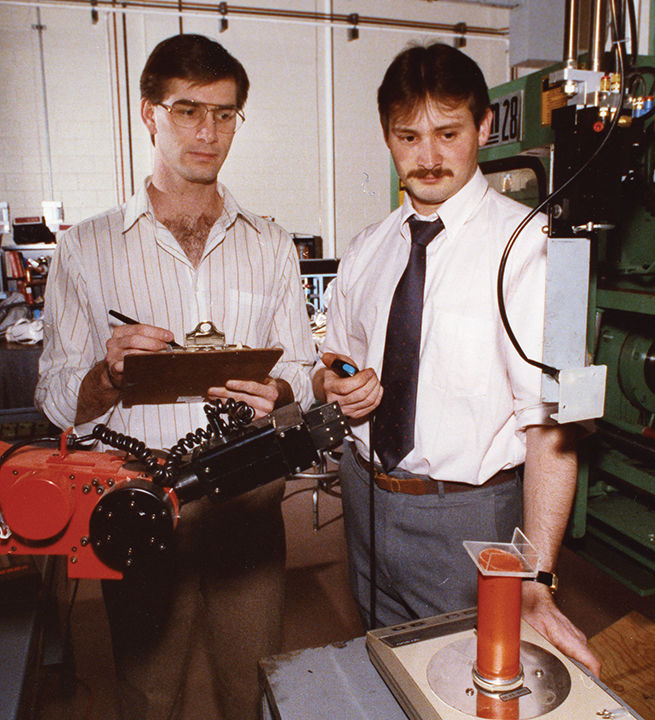Legendary Plastics Engineering Technology faculty member retires
Jon Meckley, associate professor of engineering, has a reputation as a prankster. He’s well-known at Behrend for his sometimes long-running and frequently escalating practical jokes, like the time he convinced students on a study-abroad trip that a Penn State staff member on the trip was also an undercover FBI profiler who had worked as an interrogator for the government during the Vietnam War.
“With pranks, I just keep making it more outlandish, seeing just how far I can go until someone calls me out,” Meckley said.
While many hoped that Meckley’s retirement announcement was yet another elaborate gag, it wasn’t. This spring, nearly four decades after he first set foot on campus as an undergraduate student in the mid-1980s, the School of Engineering said goodbye to one of its most charismatic and revered Plastics Engineering Technology (PLET) faculty members.
Meckley earned three degrees at Penn State Behrend: an associate degree in Mechanical Engineering Technology (MET) in 1988 and bachelor’s degrees in MET and PLET in 1990. He also holds a master’s degree in Plastics Engineering from the University of Massachusetts. He worked in industry for a few years while also teaching classes at Behrend. Eventually, he became a full-time faculty member.
As a student, he went on one of the first international PLET trips to Germany for the K-show, the industry’s top trade fair. As a faculty member, he’s organized and led international trips for PLET majors every three years for decades, visiting more countries than we have room to list, including France, Italy, Switzerland, Austria, Australia, Egypt, and China.
Pranks, plastics, and travel are only a few of his passions. We sat down to chat with Meckley before he retired in May:
What made you decide to retire?
My wife, Kim, told me that my job was interfering with her retirement. (She is a retired elementary school teacher.) But, also, during the COVID pandemic, when we were working from home, I started to like it. I just wanted to be home with my wife more.
What will you miss?
Working and joking with students in any type of lab setting. I’m going to miss the students a lot.
You’re known to be an enthusiastic and engaged adviser. What do you enjoy about it?
I like helping students figure things out, and advising is problem solving, in a way. It’s fun to find creative routes through the program that allow students to achieve their goals. It’s like a puzzle.
You were an MET student. How did you end up in PLET?
I walked by what was then a brand-new plastics lab in Zurn one day. I looked in the windows and saw them working on an injection molding machine, and I was fascinated.
You’ve led many PLET international trips. Why do you feel these are important?
Plastics engineering is a global business. You will work with people in other countries, and you may have to travel there. A lot of our students have never flown, few have passports, and many have never been out of the country. It’s a valuable educational experience for them to travel abroad and see what their industry is like in other parts of the world.
Do any of the PLET trips stand out in your mind?
We went to China in 2004, and they had the largest hand assembly of a commodity that I have ever seen. There were a hundred employees in room after room twisting printer cables together. It was astounding to see how they worked as a team. I’d love to go back and see if it is more automated now. Also, the country itself was so different.
Engineering is a challenging discipline. What have you observed about students in PLET over the years?
Anyone can do this major if they really want to. I’ve been to conferences and other trade events and run into former students who barely made it out of here with a degree, and they are thriving in the industry. I’m continually impressed by students who may have struggled in college but are killing it in the real world.
When Behrend had to move to remote learning in the spring of 2020, you were already doing it.
Yes, I had broken my leg snowboarding that winter. Never take that last run of the night! I had fallen out of balance and the tip of my board came down and torqued my leg. It wasn’t pretty. So, I was doing Zoom lectures and remote teaching months before COVID hit, and I was able to help my colleagues transition.
You’re an avid downhill skier and a former ski instructor. Any other hobbies?
I like scuba diving and take at least one diving trip on each cruise my wife and I go on. I also love photography, especially shooting motorsports events. I’m certified to borrow equipment from the Cannon Professional Services tent at races, so I can play with very expensive gear at IndyCar races.
Any plans for your retirement?
Travel and shoot fast cars—with a camera. I wouldn’t mind being hired as a photographer for a racing team. We’ve been cruising a lot. Our next big trip is a three-week cruise to Antarctica.
What would people be surprised to know about you?
That I’m actually shy.
What do you hope will be your legacy?
I don’t know. No professor is irreplaceable. In three years, I’ll just be a story that seniors and alumni tell.
At least it will be a good story. And, if not, feel free to embellish in honor of a guy who would truly appreciate a taller tale.
